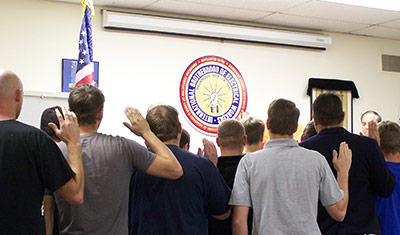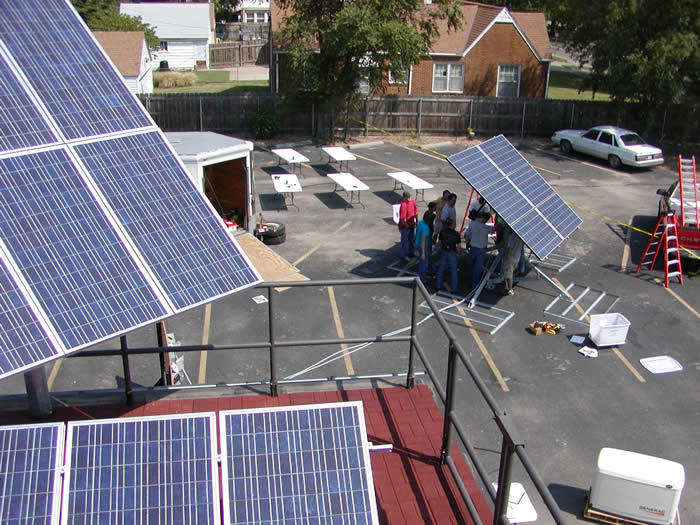Dues Reminder
Next dues owed by April 30, 2025
Pay Dues » America’s #1 Apprenticeship Program
America’s #1 Apprenticeship ProgramAre you looking for meaningful, rewarding career training that can offer you a bright future while building character and pride? The Electrical Construction Apprenticeship is what you’ve been looking for! It is a program sponsored by IBEW and the National Electrical Contractors Association (NECA). This apprenticeship program allows you to earn great wages and benefits while you learn, and it provides you with both the classroom education and on-the-job experience necessary to be a finished product upon completion.
Four years, unless the JATC gives you credit for previous electrical trade work and/or classroom experience. After completion, you will be classified as a Journeyman electrician.
You will attend a 10 hour daytime class once every two weeks. You will not earn any wages or benefits for your time spent in the classroom, but you will receive wages and benefits for all of your on-the-job training hours.
The total cost of the four year apprenticeship is approximately $4,500. This amount covers the cost of a set of hand tools, the curriculum textbooks, code books, the electrical licensing exam fee and instructional fees. Financial assistance is available to those who qualify through the Workforce Center.
You will earn wages and benefits based on your pay period for all of your On the Job Training (OJT) hours.
The apprenticeship is divided into six pay periods or levels. They are as follows:
| 1st period | First 1,000 OJT hours |
| 2nd period | 1,001 - 2,000 OJT hours |
| 3rd period | 2,001 - 3,500 OJT hours |
| 4th period | 3,501 - 5,000 OJT hours |
| 5th period | 5,001 - 6,500 OJT hours |
| 6th period | 6,501 - 8,000 OJT hours |
To advance to the next pay period, you must successfully complete your classroom activities and work the required number of OJT hours.
Yes. This program meets all of the requirements of, and is recognized by, both State and Federal agencies that govern apprenticeship programs. This program also meets all of the requirements of the G.I. Bill. Transcripts are available upon graduation, and credits may be used at various institutions to obtain an associates degree.
Most electricians wear jeans, t-shirts and leather work boots. They also have leather gloves and outdoor-wear readily available.
 IBEW: An Electrician’s Best Investment
IBEW: An Electrician’s Best Investment When you invest a very small part of your income into your union, you receive the dividends of higher wages and better benefits. In fact, according to the U.S. Department of Labor, union workers make 28% more per year in wages and benefits than their non-union counterparts performing the same job! You do the math and figure out how much more you could make in wages and benefits as an IBEW electrician.
There are two types of dues, working dues and monthly dues. The working dues equal 3% of your gross wages, are deducted directly from your weekly paycheck and are used to finance the operations of IBEW 271. Monthly dues are $49 and are paid by each member. They pay for a death benefit for each member as well as help finance the IBEW’s national office.
To sum it up, working as a non-union electrician may be costing you thousands a year in wages and benefits. IBEW dues cost you very little and you receive great wages and benefits in return.
 IBEW Electricians Get Great Training
IBEW Electricians Get Great TrainingThe electrical construction industry changes about 30% every five years. Keeping up with these changes is very difficult unless you have ready access to quality training. As an IBEW 271 electrician, you’ll have access to the best training available.
Classes include basics such as the National Electrical Code, conduit bending, transformers and motor control. In addition, new classes covering industry-changing technologies such as power harmonics, programmable controllers, photo voltaic and Lucent Technologies are continually being developed and offered as well.
Most of these classes are one to four nights in duration, one to two nights per week, and two to three hours per night.
IBEW electricians pay only a minimum fee to attend these classes. The majority of the cost is covered by our training fund. For every hour we work, our employers contribute 60 cents into this fund so that we can have access to quality, inexpensive training and can remain the most educated and highly skilled electrical workforce around.
As a Journeyman, you can check out IBEW without any financial obligation with our “Try It, You’ll Like It” trial period. During this period, you’ll receive IBEW wages and benefits, but you’ll pay nothing to the IBEW. At the successful completion of this trial period, you will be offered membership into the IBEW. If you choose to join, and almost everyone does, the admission fees are as follows:
| Membership Initiation Fee (One time fee) | $100 |
| Electrical Workers Benefit Association (One time fee) | $2 |
| First month's dues | $49 |
| Total | $151 |
Applications for the four-year electrical apprenticeship are accepted at either the IBEW #271 or the Work Force Alliance, Monday through Friday, excluding holidays. A $25 non-refundable application fee is required and due at application time.
All of the information listed under “Requirements” must be turned in within 45 days after application date. None of the information will be returned. This information must remain in the Electrical Training Center’s files. All applications will be received without regards to race, color, religion, national origin or sex. All applicants must fully meet the minimum requirements to qualify for an interview.
The JATC will interview each applicant who meets all the listed basic requirements. Interview notices will be sent to the address shown on the application unless notified of a change of address. Applicants will be selected as apprentices in order of their ranking resulting from the rating of their interview. Applicants not selected will be placed on a two-year book according to their interview scores.
Applicants selected to enter the apprenticeship will be required to supply a record showing negative results of a drug and/or alcohol abuse test at the time and place designated by the JATC.
Requirements: